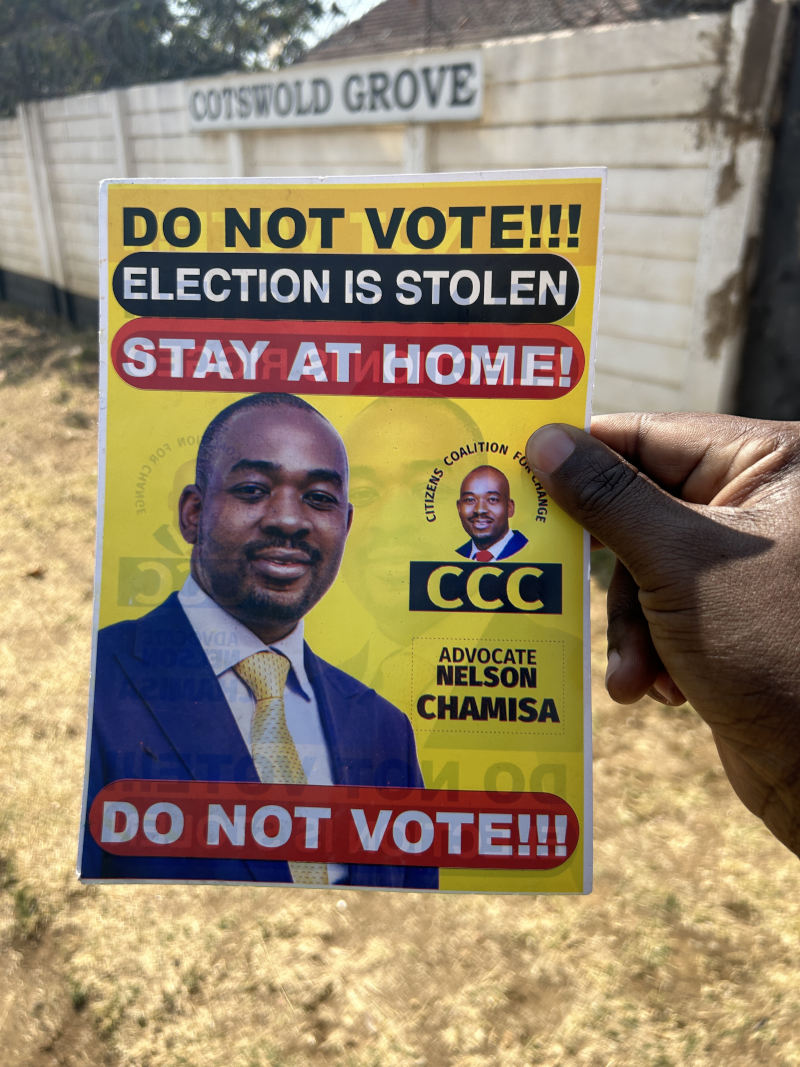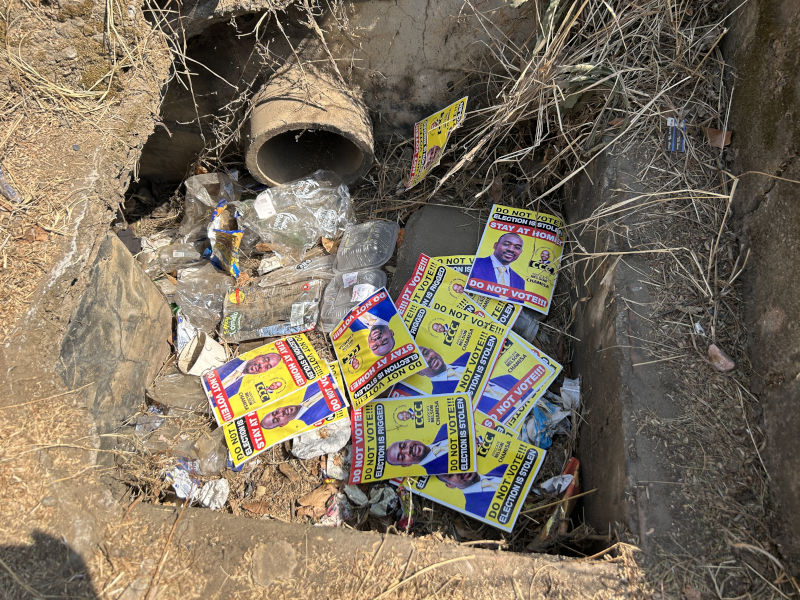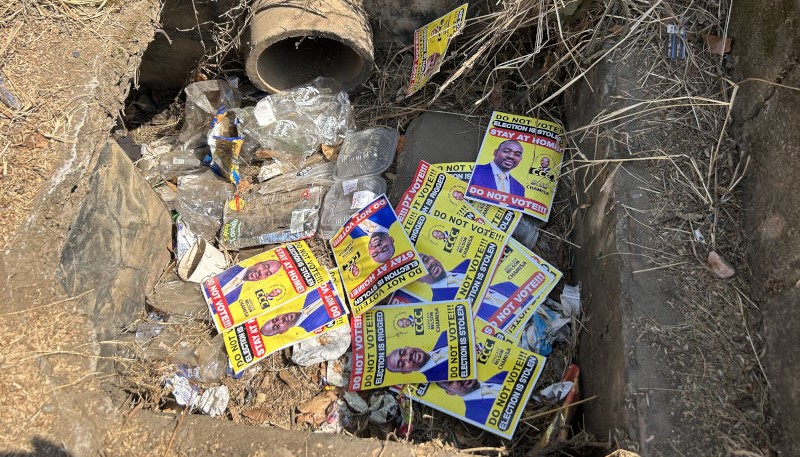The practice of manipulating facts to suit one’s own agenda is as old as humanity itself. Unfortunately, this practice has only gotten worse as technology has improved. In this age of social media, this has reached a fever pitch.
This election season we have seen many jostling on social media by political parties. It was not as bad leading up to the elections but went into overdrive on the eve of the elections and has not let up.
We can’t possibly go through all the lies and half-truths but here are a few we saw. You will notice that the goal for many of the authors was to discourage people from voting. Some of it came from overzealous ZEC and government critics who saw election tampering even where it did not exist.
The paint job
“Some voters in Zimbabwe are unable to vote because their names have been moved to other polling stations. They are only told this after election ink has already been applied to their fingers. When they arrive at their polling stations, they are told that they have already voted and are not allowed to vote.”
So read a message along those lines. As you would expect, it made a lot of people angry. “Tha dang ZEC is at it again!”
Of course, it was a load of rubbish. ZEC has enough ‘irregularities’ on its own and does not need us adding crazy stuff like this. Those that bothered to ask got responses like the following:
This is fake 🗞 news friends, you meet the usher first then you reach polling officer who checks your name on voters roll. If your name appears in the voters roll you proceed to get the three ballot papers namely local authority, house of assembly and the presidential. Indelible or phosphoric Ink is applied after getting all the three ballot papers but just before casting your vote inside the booth.
So, as those who voted will attest, if your name was not found in the voters’ roll, you would not get to the indelible link table.
The internet shutdown
We talked about this before. Most people believed the government would try to limit access to the internet.
We were so convinced that even a small dip in internet service quality meant the worst had happened. This narrative was so powerful that some stretched the truth, read too much into nothing, or even fabricated events to support it.
After NetBlocks exclaimed “Confirmed: Metrics indicate that internet service has been degraded in #Zimbabwe,” Tech Cabal ran a story on it and said they reached out to Econet for comment.
TechCabal then proceeded to provide a quote from Econet, “We are facing a system challenge and we are working towards restoring normalcy. Any inconvenience caused is sincerely regretted.”
We reached out to Econet to get more information on the system challenges that they faced on the eve of the elections. A well-placed source in the company told us that TechCabal never reached out to them. The quote was fabricated. Said the source, “They made it up. They didn’t reach out to us.”
I chalk it down to susceptibility to a compelling narrative. It was so juicy of a story that the temptation to make it real proved too strong.
Unfortunately, this news only served to inflame an already suspicious crowd. We cannot afford to dismiss this as a minor issue. This is yet another example of how social media and online media can spread misinformation and worsen an already volatile situation.
We did our own tests, asked others and turned to social media to see if there were many reports of poor internet service but could not find the evidence. There was nothing unusual to see. Yet, people still didn’t believe that the internet had not been tampered with.
Is the government even capable?
Some of the experts we talked to do not believe the government is not able to throttle the internet, even if it wanted to. Except maybe to instruct the Internet Service Providers to shut it all down, which would leave a trail for anyone to see.
When asked if the Zim government had tampered with the internet, one expert said, “No, your government are not slowing or restricting internet access. They are incapable of twiddling their f***** thumbs, never mind restricting the internet.”
This was borne out by Econet saying, “Our traffic patterns are pretty normal. So we are not sure where this is coming from.”
The narrative had taken hold and people believed in spite of contradicting evidence.
The offline voter apathy trap


This was an offline operation but it still warrants a mention. Someone out there spared no expense in trying to dishearten voters and if possible, convince a few not to vote.
CCC confirmed that they were not the ones who distributed these little fliers. Why would they print thousands upon thousands of the things, on glossy paper and in colour no less, and distribute them in the strongholds in urban areas?
I don’t think there are many political parties with the finances and the manpower to coordinate and execute such an operation. Those fliers were seen in many parts of Harare and in other towns and cities. Some of the parties that were contesting did not have enough voters/supporters to even be able to pull it off.
It just goes to show that we can complain about social media all we want. We could murmur until the second coming but it’s not technology’s fault. It’s the humans that are to blame. We lie, cheat and deceive to achieve our goals and even if we banned social media in Zimbabwe, that would not change.
I guess, as Zimbabweans, it is our duty to be critical consumers of information. We should always verify the authenticity and accuracy of any content we come across, even if it sounds good to us. This is especially important in the age of social media, where misinformation can spread quickly and easily.
Also read:
No, the Zimbabwean govt has not disrupted the internet ahead of election day, it’s something else
Social media exaggerates and so should be regulated, says ZEC. No election rigging in most cases.

16 comments
Tipei ma results
For now i am waiting results acho
Where is mandla
Thanks to all that exercised their rights in good faith. Apathy can be hard to overcome when you hear demoralised people say ‘whats the point’ and then see them mostly vindicated as the playbook is yet again unchanged. Oh well, time to buckle up for the last act of the play. Monday should be interesting.
People who didn’t vote don’t need to complain if this government is not removed. If you can’t exercise your right once in five years then I don’t see were you need to have your voice heard.
On the last paragraph every one knows who had the money, the personnel and time erect a last minute scarecrow. We don’t even need to guess.
Which leaves the question ” If you’re not afraid of losing why try such antics?”.
No need to castigate the folks who did not exercise their right to vote! Maybe they are waiting for a time when the process is FAIR because last I checked it’s only a fool that continues to do the same thing and expecting different results ( I’m not implying that lads who did vote are fools?)…
Who is the fool, not voting has not changed anything and the worse part is, it will never change anything. Continuously not voting gets no results. Its better to do something and fail than do nothing at all. I think its time to apply a little grey matter here.
First and foremost i donot have definitive proof of rigging, how often it occurs or how its done.
There is the possibility (though very ,very low) that there could be no rigging at all and there are those that have leveraged voter apathy to their advantage. They know most who are against them donot vote, so it means they donot really need the majority to win.
There is the possibility that rigging only occurs occasionally, like i said i donot know for sure. Maybe we can get lucky and catch them unawares, when they have the hubris to think they have successfully pulled the wool over everyone’s eyes (i think its happened before).
There is the possibility that rigging only occurs at select locations (constituencies) , again i donot know for sure. Maybe.
My point is this, Zim is like your own personal life, you can sit around waiting for something to happen to you or you can make your own luck by doing something and taking every little opportunity you can get.
And donot say that our votes have counted for nothing. Past elections have changed the country forever, sure they have not delivered the change i wanted but there has been “some change”. Some of these changes we still feel them today.
This year there were those counting on two thirds majority for some reason, it did not happen for them, this will no doubt have a major effect on the future of the country. It means, by law in the next election there will be a new President (at least a high probability) . I donot know about you , but having 2 changes in the Presidency within a a generation is unheard of in this country. Its going to happen, our votes counted for something, so there!!!!!!
The other argument, is this , if you donot vote, what is the alternative? I have not seen anyone with the balls to execute such (you know what i mean).
So, from this perspective i will gladly be the fool and continue with the ritual of voting when ever i get the opportunity to do so. There is no risk, nor cost to me, but the reward is priceless.
Word 🤗🤗🤗
We as receivers of information always wish we could spread the little I just heard without even verifying.
Without verification my lad you would be liable for disinformation BUT lad if you believe in your narrative a few days behind bars would not kill you kkkkkk
Techzim is a hub of nuetrality…. 😎
Every little thing or wrong that goes on in zim,be it elections or anything is treated with a microscopic eye. It’s crazy,how Africa, the world expects a very perfect situation in this country. Nothing will change, unless you change your selves people.
Telone has been down since Monday in most areas. Coincidence?
🤦🏿♂️ What an effin waste of time this whole thing was. Come time for the next round, expect a direct attack on the constitution. If things get spicy, I hope y’all will have your exit plans or some nice plate carriers ready. We just might need them.
Deceit and lies are the election results
there shouldn’t be any election im Zimbabwe, what a waste of time and resources. we all know the same outcome since 2002.